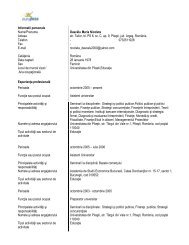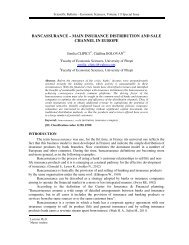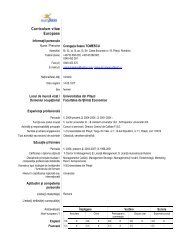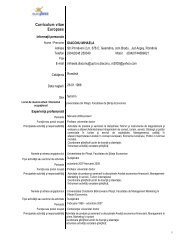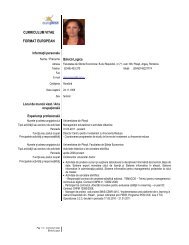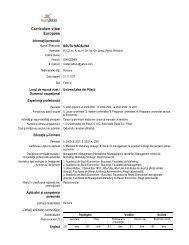buletin Åtiin ific - Facultatea de Stiinte Economice - Universitatea din ...
buletin Åtiin ific - Facultatea de Stiinte Economice - Universitatea din ...
buletin Åtiin ific - Facultatea de Stiinte Economice - Universitatea din ...
- No tags were found...
Create successful ePaper yourself
Turn your PDF publications into a flip-book with our unique Google optimized e-Paper software.
Stu<strong>de</strong>nts: The Overlooked Products in Aca<strong>de</strong>mic MarketingThose capabilities can be <strong>de</strong>veloped among stu<strong>de</strong>nts, inexpensively and in only twoweeks of intensive training. How? The basic approach was <strong>de</strong>veloped in England after WorldWar Two by Bernard Haldane 1 who discovered how to assist soldiers in converting militarytraining and combat experiences into skills nee<strong>de</strong>d by civilian organizations. Haldane was sosuccessful that he took his system to America and, through a fortuitous series of connections, hisapproach was further <strong>de</strong>veloped and presented to millions in the popular job-search manual,What Color is Your Parachute. 2The book has been updated every year since 1975, and the 2008 edition opens with astinging indictment of aca<strong>de</strong>mic institutions. Its author, Richard Nelson Bolles, an Anglicanpriest, asserts that when you are looking back at your education, you realize that:…there are three things a good education should have given you … but in yourcase, did not. High school or college should have taught you … How to chooseand find a job …. How to choose and find a partner, or husband, or wife …. Howto think, and how to make good <strong>de</strong>cisions. 3Bolles refers to these as the “three basic life skills.” Though the emphasis here is on job searchand launching a career, it may be useful to recall that in America, at least, it was not too long agothat it was usual to interview spouses as well as applicants before hiring someone for a highvisibilityrole. And as for thinking, few recent graduates seem to have encountered the conceptof second- and third-or<strong>de</strong>r consequences, whether they are personal, professional, technical, orfinancial. That is, having been reared in what has been essentially a bountiful and forgivingenvironment, they have never learned to calculate possible consequences of their <strong>de</strong>cisions (sex,drugs, rock and roll, etc.).Of course, it has long been established that educational institutions should not stand in locoparentis, and this article does not suggest a change in that posture. However, it may be that mostinstitutions have been slow to recognize and respond to <strong>de</strong>velopmental gaps among theirstu<strong>de</strong>nts. And with mo<strong>de</strong>rn teaching/learning technologies, such gap-closing need not competewith established aca<strong>de</strong>mic discipline for stu<strong>de</strong>nts’ time and attention.Paralleling Bolles’ life skills, what stu<strong>de</strong>nts need is (1) to learn how to “package” themselves forsuccessful job search; (2) to <strong>de</strong>velop skills in researching industries and companies with needsthat match stu<strong>de</strong>nts’ potential for contribution; and (3) to gain experience in mock interviewsituations in much the same way as attorneys acquire courtroom skills through mock trials.Stu<strong>de</strong>nts assimilate Parachute’s content best by working in groups, using peer coachingalong with instructor input to accelerate learning that has three main components:1. I<strong>de</strong>ntifying the success factors that recur in each stu<strong>de</strong>nt’s life; that is, innate abilitiesseen in successes as early as age five that will be found in most successes at all subsequent ages.When i<strong>de</strong>ntified, these abilities become an individual’s success pattern. Through success-patternanalysis, it is possible to i<strong>de</strong>ntify situations in which an individual is likely to be successful, andfrom there it is easier to i<strong>de</strong>ntify professional roles in which individuals will succeed.2. Where are such roles found? Rather than scanning want ads and job postings, currentjob-search advice 3 directs job seekers to i<strong>de</strong>ntify industries, then companies within them, thenone in which the individual wants to work. The next step is to research that company in <strong>de</strong>tail,6



